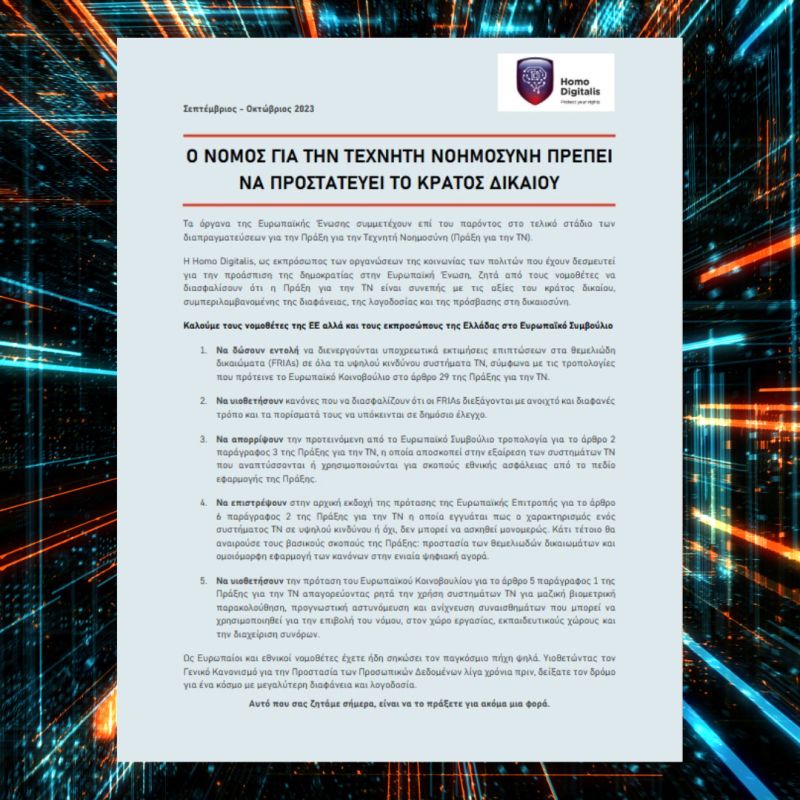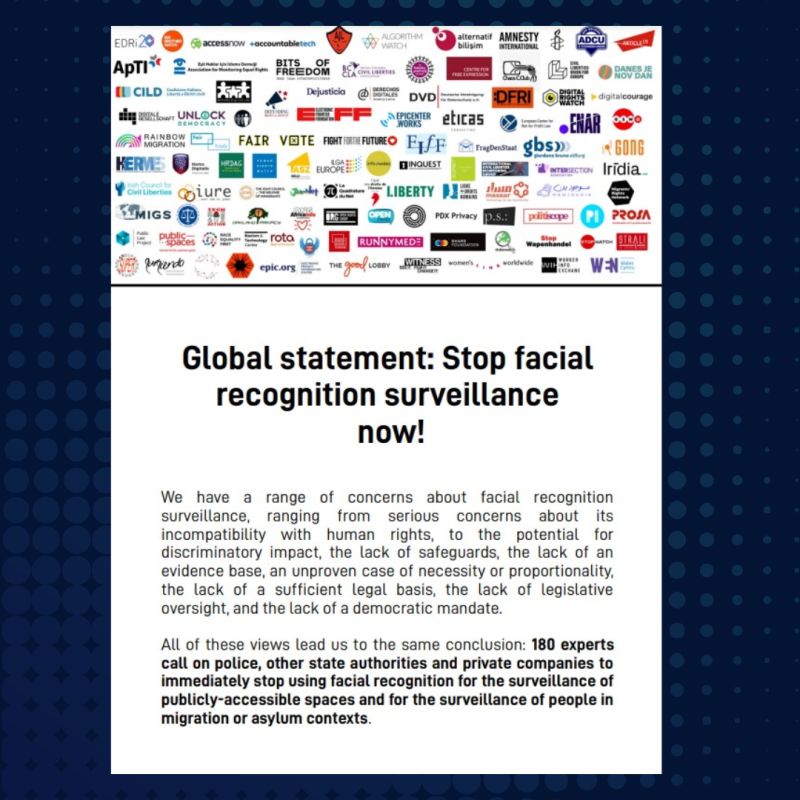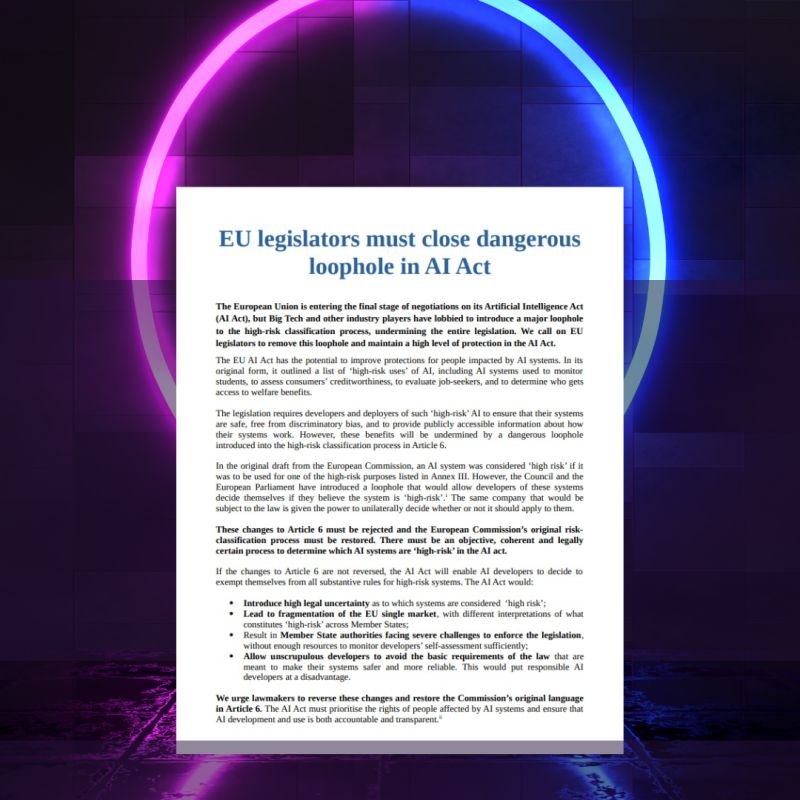Homo Digitalis participates in a New York University meeting on Artificial Intelligence
Last week, Homo Digitalis was invited to participate in the strategic meeting “Co-creating a shared human-rights agenda for AI regulation and the digital welfare state”, organized by the Center for Human Rights and Global Justice at New York University Law School and Amnesty Tech’s Algorithmic Accountability Lab!
It is always a great honor to see our work to promote and protect human rights recognized internationally, and we thoroughly enjoyed sharing ideas, expertise and knowledge with an amazing group of academics, civil society organizations and other stakeholders around the world.
⚡ Our group was represented at the Strategy Session by Board Secretary Eleftherios Chelioudakis. Stay tuned for more exciting partnerships!
The European Parliament did not adopt our request for a complete ban on the use of spyware in the EMFA provisions
Yesterday, the European Parliament adopted its proposed provisions for the Regulation establishing a common framework for media services in the internal market (EMFA). Now the proposed texts enter the next legislative phase: the trilogue conferences.
Already last week, together with 80 other civil society organisations, journalists and journalists’ unions, we had sent an open letter to MEPs calling on them to adopt a complete ban on the use of spyware, which is a direct attack on our democratic societies and the protection of Human Rights.
Unfortunately, MEPs did not adopt this proposal, but we have enough time to exert pressure and turn the situation around in the trilogue phase.
In Greece we have seen reputable journalists with very important research work being targeted by such spying software, and it is the duty of all of us to join our voices to protect press freedom and independent journalism.
Request for a meeting at the Ministry of Digital Governance for AI ACT
On Friday 29/9, Homo Digitalis requested a meeting before the Minister of Digital Governance, Mr. Dimitris Papastergiou, in the context of the trilateral negotiations taking place at EU level for the adoption of the proposed AI Act. In addition to our request for a meeting with the Minister, we attach a one-page statement, in which we briefly set out the specific issues we wish to discuss in more detail with him.
Our aim is to present to the Minister and to the Greek Government’s representation at EU Council level our views on the proposed provisions in more detail and to learn more about Greece’s positions in the trilateral consultations already taking place.
We call on European legislators to ensure full consistency with the principles of the rule of law in the AI ACT
We continue the actions of co-shaping political decisions at European level for the proposed European regulation on Artificial Intelligence (AIAct)!
Together with the Civil Liberties Union for Europe, European Center for Not-for-Profit Law Stichting, European Civic Forum and 60 other CSOs, we call on EU-level legislators to ensure that the proposed provisions are fully consistent with the principles of the rule of law, including transparency, accountability and access to justice. You can read our joint letter here.
Action is also coming at national level!
We demand an end to the use of mass biometric surveillance technologies by law enforcement authorities in public places
Today, 120 civil society organisations and 60 academics, scientists and other experts on new technologies are joining forces to stop the use of mass biometric surveillance technologies by law enforcement authorities in public places.
It is a great honour for Homo Digitalis to be part of this initiative. Already since 2020 with European Digital Rights we have been involved in the #ReclaimYourFace campaign, in which more than 250,000 people across the EU signed our petition to ban these practices.
You can read the joint statement here.
We express our concerns about Article 6 of the proposed AI legislation
As the European Union enters the final stage of trilateral negotiations on the proposed AI legislation, more than 150 civil society organisations, including Homo Digitalis, are concerned about a major loophole regarding the classification process for high-risk systems in Article 6!
Big tech companies have managed to convince the European Parliament and the Council to adopt proposed provisions that essentially leave them to decide for themselves whether the system they develop should be considered “high-risk” or not!
Read our joint statement to learn more about the challenges involved here.
Homo Digitalis in Brussels to speak at two important events
Homo Digitalis made a lightning trip to Brussels this week!
There we attended the annual plenary meeting of the Justice, Equity & Technology (JET) Table at The London School of Economics and Political Science (LSE), which we have been members of for more than 2.5 years now, studying the implications of using technologies to defend specific social groups based on class and race.
We also successfully participated for another year in FreedomNotFear, where we had the great pleasure to organise a talk regarding the use of intrusive technologies in the field of border protection and our related legal actions for 2019-2023.
For Homo Digitalis, our Board Secretary, Eleftherios Chelioudakis, travelled from Greece to Brussels
FRONTEX responds to Homo Digitalis' Request for Access to Information on EUROSUR and the deadly shipwreck in Pylos
In June 2023, Homo Digitalis had filed a request for access to documents before FRONTEX in order to explore whether the EUROSUR system, which is composed of drones and satellites, among other technologies, was in operation during the fatal ship’s voyage from 9 to 13 June in the Mediterranean Sea and the reasons why it did not prevent this fatal shipwreck.
Today, FRONTEX replies that the EUROSUR system, despite being fully operational, has not been able to do what it promises, namely to detect large vessels that may be used by criminal organisations to transport people in the Mediterranean, putting the lives of the latter at high risk. This is a major revelation by Homo Digitalis, demonstrating that the very expensive – tens of millions of euros – solutions promised by technology companies to complex issues such as border management and the protection of people who put their lives at risk have failed. EUROSUR failed to locate the large floating vessel, despite the fact that it had been right in its field of control for more than 3 full 24 hours.
You can see the text of the reply we received here.
Homo Digitalis co-organizes with the Digital Freedom Fund the Strategic Litigation Meeting for the first time in Greece!
The Digital Freedom Fund’s Strategic Litigation Meeting is back!
In collaboration with Homo Digitalis and with funding from Luminate, the retreat will take place in Athens from September 11-14. If you are planning to take legal action against major tech companies or other class actions, register now here.
The retreat hosts training sessions and workshops aimed at developing participants’ legal skills and tactics in a relaxed and collaborative environment with other colleagues. DFF also hopes to be able to sponsor some of the cases that participants develop during the meeting.
After two online versions due to the COVID-19 pandemic, DFF is pleased to bring the event back to its true essence as an in-person retreat where participants can disconnect from other activities and commitments to work in depth on the study and strategic planning of their cases.
In the latest post on the DFF blog, legal counsel César Manso-Sayao shares more details about the retreat, as well as some thoughts regarding recent developments on the liability of large platforms. Read it here.
Artwork by Kruthika N.S.








